 |
Newsletter |
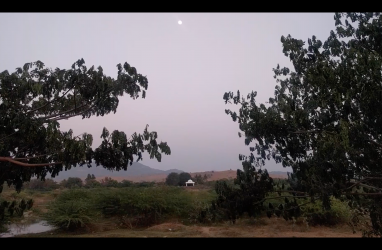 Dear readers, I would like to give some space in this letter to an important piece of writing by the artist Alina Popa, shared with us by a former resident and friend, Leah Clements. You can read the full text here, but here are two paragraphs. Please also share it: Realization: I have never trusted my body and its responses. We are taught so by education. Fever needs to be kept at bay, symptoms have to be read by specialists, you don’t own your body, it is like a foreign coat you have to take care of and beware of it, look for signs, gather evidence. You are outside of your body, you analyse it scientifically but what does this mean. It means that you are placing it in the scripts written by strangers who are afraid of the wonder of reality and want to restrict its vastness to a few predictable scenarios. To change the standard perspective is almost impossible. It cannot be done mentally, it needs different practices – to practice ways to interact with the world that give back reality its multiplicity. We actually don’t truly interact with the world anymore. Getting in the way of these meaningful interactions and the cultivation of wonder with the world are oppressive attitudes and assumptions. We all carry these with us. They insidiously bubble away in our everyday lives; often we aren’t aware of how we enact, perpetuate and impose them. Helping us to cut through these assumptions and to think about questions of access, Leah Clements together with Alice Hattrick and Lizzy Rose have raised a series of questions which I would urge you to share with colleagues and friends. It is here. These are questions which raise consciousness and provide possibilities for us to put in place the steps needed to interact with openness and care. If you need further inspiration for this, then I would encourage you to see the films by former residents Avni Dauti & Rebecca Vaughan, Sophie Hoyle, Leah Clements, Milda Januševičiūtė and Abri de Swardt, whose works can be considered in relation to ‘crip’ perspectives and ways of being. ‘Crip’ is a term that emerged from disability movements and is a positive reclaiming of the derogatory term ‘cripple’. It is, in this sense, like the term and practice of queering, which in Lithuania has a scarcely narrated history. One of the current Alternative Education participants, Milda Dainovskytė will redress this too often unacknowledged history in her presentation at Rupert, ‘Tools of Introspection. Veronika Šleivytė’. The talk is dedicated to a Lithuanian photographer, Veronika Šleivytė (1906 – 1998), a leader of a newly established women artist’s association, a bravely experimental artist during the interwar period in Kaunas, Lithuania and an artist whose life and work can be read in terms of queer histories. If you’re in Vilnius, feel free to join for these events, otherwise, follow my social media and the website for future updates and news! My best, Image: Milda Januševičiūtė, a still from the video work ‘hope it finds you well’, 2018 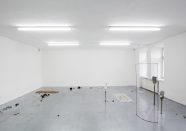
In residence
Anastasia SosunovaAnastasia Sosunova (Lithuania) is a visual artist from Vilnius. Using a variety of media such as video, installation, writing and printmaking, her work focuses on the ways in which communities and identities are formed, subsist and come undone. At Rupert, she will be producing new objects, exploring the boundaries between private and public belonging in the urban and suburban environments. Reading into the signs and gestures bodies leave behind, Anastasia will be researching how the definitions of territory, border and personal space have been evolving in changing political and economic climates of the local region. 
In residence
Joshua SchwebelJoshua Schwebel (Canada/Germany) is a Canadian conceptual artist currently based in Berlin. Through artistic interventions, his work de-centers institutional authority and makes visible power structures and hierarchies residing in the art system. While at Rupert, Joshua will be undertaking a research project into the status of amateur artists, and the defining characteristics that distinguish the professional from the amateur. This project will consider what actually distinguishes the two modes of practice, other than a declarative aspiration, external critical opinion, formal education, or entitlement. |
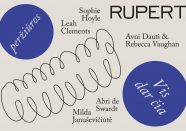
Screening programme
17 April, 5:30–7 pm Still HereRupert is pleased to invite all to a screening of five films by current and former artists-in-residence and alumni at Rupert. The screenings will start at 5:30 pm on the 17th of April 2019 at the National Gallery of Art, Vilnius, cinema. More info. 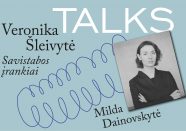
Talk
24 April, 6–8 pm Milda Dainovskytė: Tools of Introspection. Veronika ŠleivytėThe talk, ‘Tools of Introspection. Veronika Šleivytė’ by curator, artist and participant of the 7th Rupert Alternative Education programme, Milda Dainovskytė will take place on the 24th of April from 6pm at Rupert. The talk will be held in Lithuanian with supplementary visual material in English. The event is free and open to public. More info. 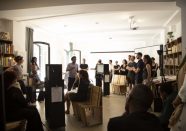
In residence
Jan, 1 January, 1–2 pm Abhishek NilamberAbhishek Nilamber (India/Germany) is an independent artist and curator living and working in Berlin. Primarily working at SAVVY Contemporary, Berlin and as artistic consultant for Backyard Civilization, Kochi, India, his work focuses on projects and products which democratise accesses to knowledge, culture and art. As part of the long term research and exhibition project, UNITED SCREENS, at Rupert Nilamber will be working with technology experts and critics from Vilnius Tech Park and Pakrantė to come up with a programme to distribute South-to-South cinema. |
